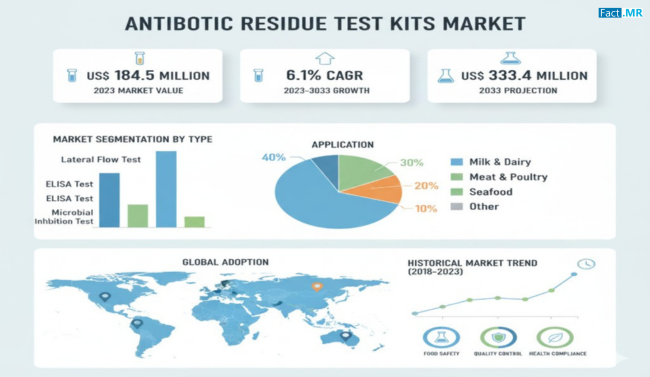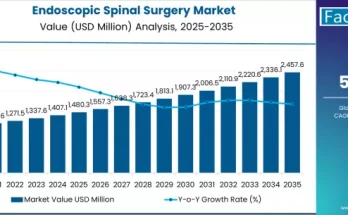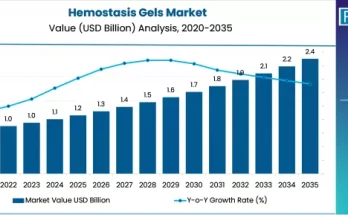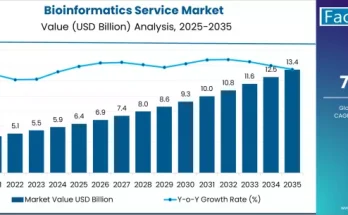The antibiotic residue test kits market is emerging as a critical component in safeguarding food safety and public health. With increasing consumption of animal-derived products globally, detecting and managing antibiotic residues in food has become essential. These test kits help prevent health risks associated with antibiotic contamination, ensuring compliance with regulatory standards and promoting consumer confidence in food products.
Market Overview:
Antibiotic residue test kits are diagnostic tools used to detect the presence of antibiotic residues in food products such as milk, meat, and poultry. The kits cover various antibiotic classes, including beta-lactams, macrolides, tetracyclines, aminoglycosides, and sulfonamides. By providing rapid, accurate, and reliable detection, these kits play a pivotal role in preventing the consumption of contaminated products. Advancements in testing technologies, such as rapid and automated kits, are further enhancing their efficiency and adoption across industries.
Regional Insights:
Asia-Pacific is emerging as a key market for antibiotic residue test kits due to rising production of animal-derived food products and stringent food safety regulations. Countries like China, Japan, and India are witnessing increasing demand for rapid and reliable testing solutions to meet growing regulatory and consumer expectations. North America, particularly the United States, maintains a strong market presence due to rigorous food safety standards, widespread meat and dairy consumption, and high pet ownership driving veterinary testing. Europe represents a mature market with strict food safety mandates and significant investment in biotechnology and veterinary care, ensuring high adoption rates of antibiotic residue test kits.
Key Trends & Forecast:
- Growth of Food Safety Awareness:Consumers and regulators are increasingly focused on ensuring safe food supply chains, driving demand for reliable test kits.
- Technological Advancements:Innovations in rapid testing, automation, and multi-antibiotic detection kits are improving efficiency and accuracy.
- Rising Veterinary Applications:Increasing pet ownership and investments in veterinary healthcare are boosting demand for test kits in veterinary settings.
- Focus on Meat and Dairy Products:High consumption of meat and milk worldwide necessitates stringent testing for antibiotic residues.
- Sustainability and Compliance:Regulatory bodies are enforcing stringent standards to reduce antibiotic misuse and ensure public health, enhancing market growth.
Applications & End-Use Outlook:
Antibiotic residue test kits are utilized across several industries and applications:
- Food & Beverages:Ensuring milk, meat, and poultry products are free from harmful antibiotic residues to maintain consumer safety.
- Veterinary Services:Detecting antibiotic residues in animals to support treatment compliance and prevent contamination.
- Independent Laboratories:Offering testing services for food manufacturers and regulatory compliance.
- Other Applications:Quality control in animal-derived products and research initiatives to study antibiotic usage.
The increasing importance of food safety, along with stricter regulatory requirements, has made antibiotic residue test kits indispensable for producers, distributors, and laboratories involved in animal-derived products.
Competitive Landscape:
The market features leading global players and innovative companies focused on technological advancements and reliable solutions. Key strategies include:
- Development of rapid, multi-residue detection kits.
- Expansion of global distribution networks to meet rising demand.
- Collaboration with food producers, veterinary services, and regulatory authorities.
- Investment in research to improve accuracy, speed, and user-friendliness of kits.
Major players include IDEXX Labs, Thermo Fisher Scientific, Labtek Services Ltd., NEOGEN Food Safety, DSM, Charm Sciences, Eurofins, Sciex, Perkin Elmer (BioScientific Corp), and R-Biopharm. These companies emphasize product reliability, innovation, and regulatory compliance to strengthen their market presence.
Key Takeaways of the Report:
- Beta-lactam test kits are expected to account for the largest share due to widespread use of this antibiotic class.
- Asia-Pacific offers significant growth opportunities due to rising animal-derived food production and regulatory enforcement.
- Food & beverages remain the largest end-use segment, driven by consumer safety and compliance standards.
- Veterinary applications are expanding alongside increased pet ownership and investments in animal health.
- Rapid and automated test kits are transforming market dynamics, improving efficiency and adoption rates.
Market Drivers and Key Trends:
The growth of the antibiotic residue test kits market is fueled by increasing awareness of food safety, rising consumption of animal-derived products, and stringent regulations to prevent antibiotic misuse. Advances in testing technologies, such as rapid kits and multi-antibiotic detection systems, are further driving adoption. Additionally, the growing veterinary care sector and rising pet ownership are creating additional avenues for market expansion. The need for compliance, quality assurance, and public health protection remains a critical factor influencing market demand.
Company Profile:
Leading companies in the antibiotic residue test kit market focus on technological innovation, product reliability, and global distribution. Companies are investing in R&D to develop rapid and automated testing solutions capable of detecting multiple antibiotic residues simultaneously. Start-ups and niche players are targeting specific segments such as dairy testing, veterinary diagnostics, and independent laboratories to expand their market reach. Collaborations with food producers, regulatory authorities, and veterinary services are enabling companies to strengthen market presence and meet evolving consumer demands.
Conclusion:
The antibiotic residue test kits market is poised for steady growth as global awareness of food safety, regulatory compliance, and veterinary care continues to rise. Increasing consumption of animal-derived products, advances in testing technologies, and stricter regulations are driving widespread adoption of these kits across food, veterinary, and laboratory sectors. Companies that focus on innovation, speed, accuracy, and user-friendly solutions are well-positioned to capitalize on the growing demand, ensuring food safety, public health, and operational compliance worldwide.
Browse Full Report – https://www.factmr.com/report/496/antibiotic-residue-test-kits-market



